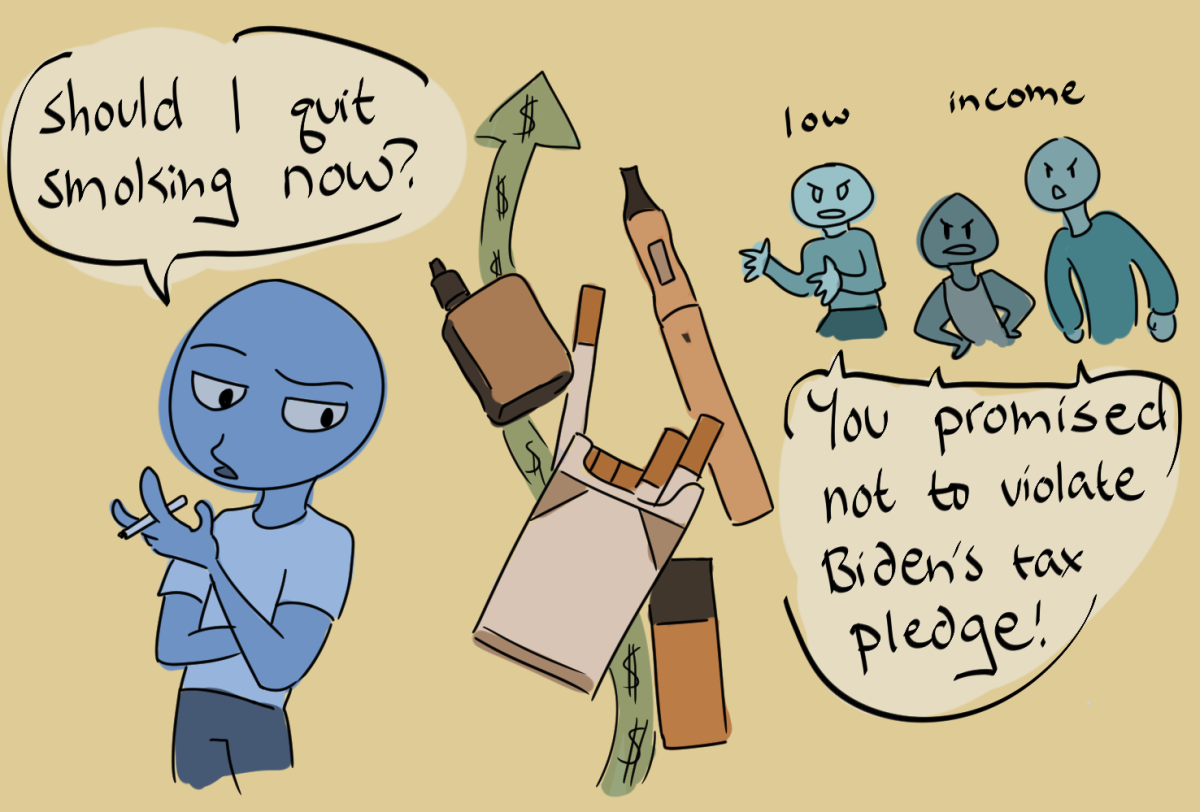The tobacco and nicotine industry may burn because of President Joe Biden’s recent tax hikes. Although many hate the idea of tax hikes, I believe that this will help the fight against smoking.
Democrats advanced a bill on Sept. 14 that will increase taxes on tobacco and nicotine products to help pay for Biden’s $3.5 trillion spending plan, according to a Sept. 15 CNBC article.
The proposed plan will have a lasting effect on low-income smokers in a positive way by changing their mindset about smoking and making consumers think twice before spending extra money on tobacco products.
Although some say this violates Biden’s pledge to not raise taxes on Americans making less than $400,000 a year, it’s beneficial to spike taxes on these products because it can reduce smoking and smoking-related illnesses.
The 2021 Tobacco Tax Equity Act would double the federal excise tax that consumers pay to purchase tobacco products, adjust it to inflation and tax non-combustible cigarette alternatives including vaping devices at the same rate as traditional cigarettes, according to a Centers for Disease Control and Prevention (CDC) study.
Americans living below the poverty line smoke at higher rates than the general population, according to the Sept. 15 CNBC article.
These individuals may smoke for twice as long as people making triple their level of incomes, according to the CDC webpage.
Higher taxes on nicotine and tobacco would seriously help reduce smoking, yet many Americans are angered at the thought of a tax spike.
There are more than 34 million smokers in the U.S. and more than 16 million are living with a smoking-related disease, according to the CDC’s Smoking and Tobacco Use webpage.
Nearly 40 million U.S adults still smoke cigarettes and about 4.7 million middle and high school students use at least one tobacco product. Each year nearly half a million Americans die prematurely of smoking or exposure to secondhand smoke, according to the same CDC webpage.
These numbers should wash out the low-income Americans’ anger toward the tax policy change.
Tobacco taxes can benefit smokers who quit, reduce the overall consumption of tobacco, and put smoking cessation on the radar of those who continue to smoke, according to the Centers for Disease Control and Prevention (CDC) study.
This is a strong fact that can stop outraged smokers who believe taxing more on tobacco products is bad.
The tax policy change will influence the youth and young adults, who use these products the most.
Youth and young adults are two-to-three times more likely to respond to changes in prices than adults, according to a Jan 15, 2019 Truth Initiative article.
Truth initiative is the largest public health nonprofit organization in the U.S. that’s committed to eliminating tobacco use and nicotine addiction, according to its website.
Economists have estimated that raising the cost of cigarettes to $10 per pack nationwide would result in 4.8 million fewer smokers between the ages of 12 and 15, according to the same Truth Initiative article.
Illnesses caused by exposure to secondhand smoke is another factor to consider, especially when it comes to non-smokers who are affected in low-income households.
Secondhand smoke contains more than 7,000 chemicals and upon smoking, people inhale the same cancer-causing substances and poisons that cardiovascular diseases and lung cancer in smokers, according to the CDC Smoking and Tobacco Use webpage.
Low-income populations are more likely to suffer the harmful health consequences of exposure to secondhand smoke, according to the same CDC webpage.
This act can’t make low-income consumers completely stop smoking but cutting through wallets will have an influence on whether or not people think it’s worth purchasing tobacco products.
Biden’s tax increase can also help low-income consumers who are trying to quit.
About 35% of these people have less success in quitting than 58% of those who live at or above the poverty level, according to the CDC webpage.
About 67% of low-income adults who smoke cigarettes daily attempt to quit smoking compared with about 70% of those living at or above the poverty level, according to the CDC webpage.
The number of people who’ve tried to quit and failed can put into perspective the tobacco and nicotine industry’s stranglehold on Americans, especially those who live below the poverty line income.
This tax increase will be a major contributor in stopping low-income consumers from smoking their lives away.
Honestly, it’s just about time.









































